Ranked! The 20 best South American players of all time
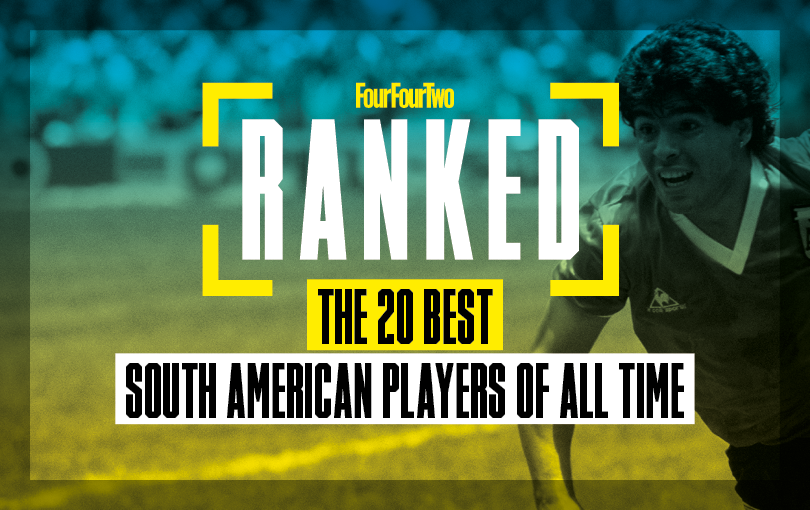
- Oops!Something went wrong.Please try again later.
- Oops!Something went wrong.Please try again later.
- Oops!Something went wrong.Please try again later.
- Oops!Something went wrong.Please try again later.
- Oops!Something went wrong.Please try again later.
Football lives in South America. Sure, it may have been invented centuries ago in China; the laws which we bicker over may have been scribed in England in the Victorian age.
But no continent has defined the global game quite like those 12 countries: principally, Argentina, Brazil and Uruguay. The three South American nations to have won the World Cup have come to shape football as we know it through brilliance and brute force alike, taking home 10 titles between them.
And they've provided some of the greatest footballers to have ever graced the planet, while they're at it. It's not just those three countries, either.
The 20 best South American players of all time: 20. Jose Andrade
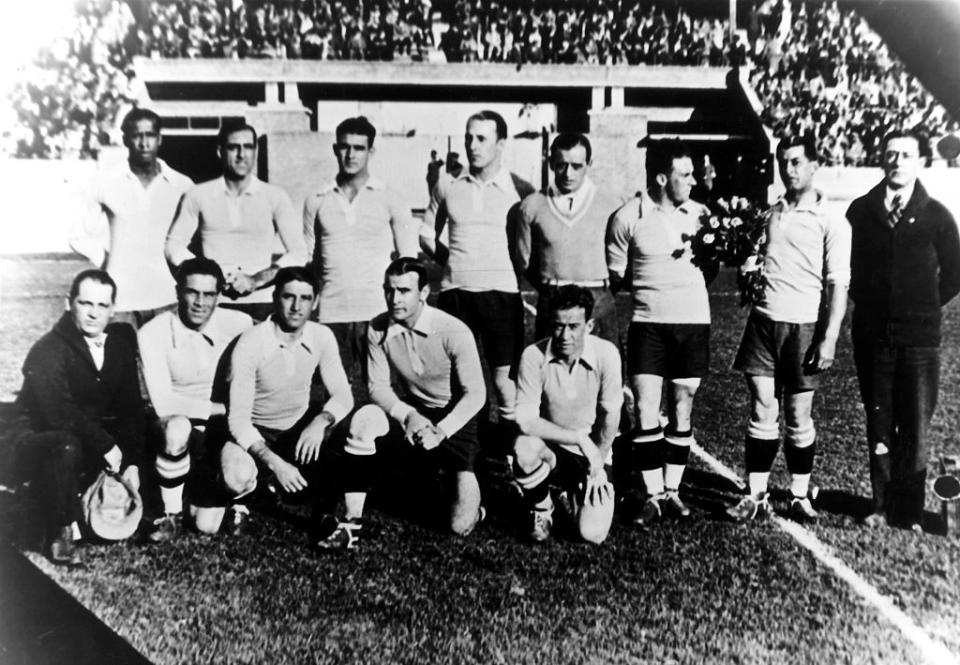
Although skinny and slight, the defensive midfielder dominated with his athleticism as Uruguay impressed in the late 1920s at the Olympics and at the 1930 World Cup.
As football wasn't yet professional in his native country, Andrade also worked as a street musician and shoe-shiner while turning out for Nacional and Penarol. The ‘Black Pearl’ gained notoriety at the 1924 Olympics for daring to throw rocks back at hostile Argentina fans, who'd pelted the visitors with them before the match. Uruguay's victory in the 1930 World Cup Final over their South American rivals gave him a huge sense of pleasure.
19. Dani Alves
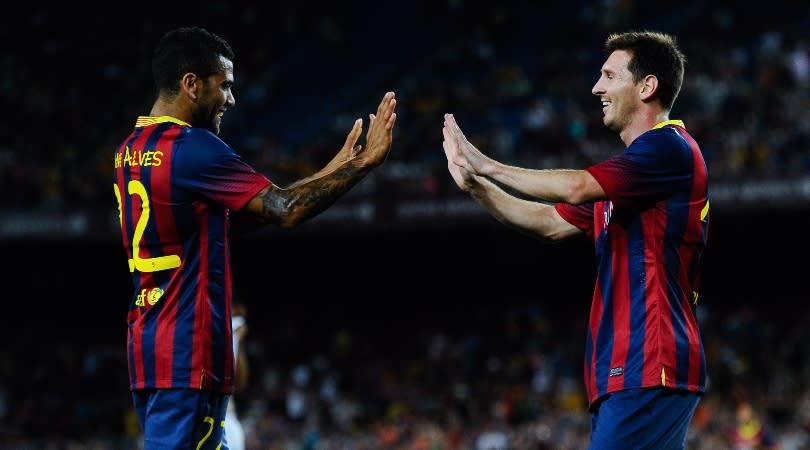
Having Dani Alves as a right-back was a cheat code. He was an extra midfielder when needed; a world-class attacker, too.
Having him in Barcelona's side alongside Xavi, Iniesta and Messi just wasn't fair. Alves the strength and tenacity of a champion and won just about everything in his career with a fantastic engine and a truly elite final product. Some say he's still the greatest right-back in the history of the game.
18. Teofilo Cubillas
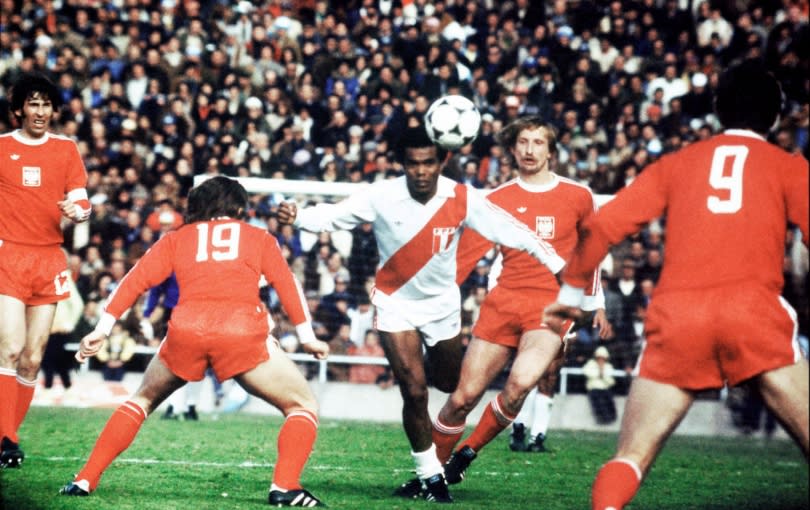
The greatest Peruvian player in history, Cubillas is remarkably the only non-German to have scored at least five goals at two different World Cup tournaments, in 1970 and 1978 (he scored five in both).
Blessed with outstanding vision and a powerful shot, he was a phenomenal set-piece specialist, usually striking the ball with the inside of his foot. Having scored at will for his beloved Allianza Lima, he was also successful at Porto and later played at Fort Lauderdale Strikers alongside George Best.
17. Daniel Passarella
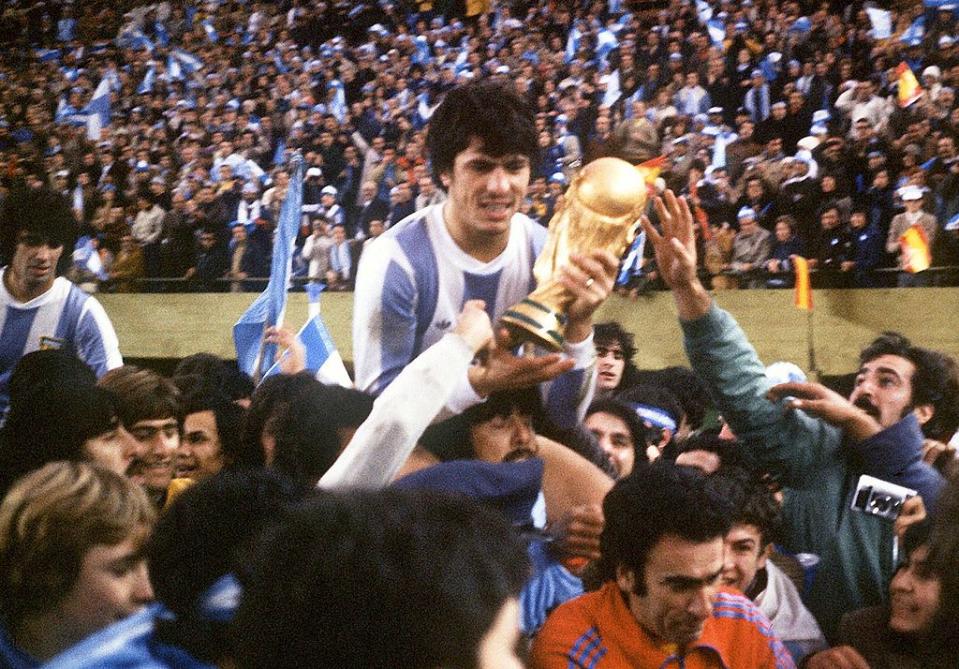
Widely considered one of the best centre-backs of all time, Passarella is remembered for his range of qualities. The Argentine was a ferocious defender, strong in the tackle and extremely good positionally. His heading abilities were absolutely extraordinary given the fact that he was just 5ft 8in tall.
His attacking contribution was incredible, with 175 goals scored in all competitions. Passarella was also known for building the attacks from behind with his immaculate passing. His leadership qualities were second to none, and he was nicknamed the Great Captain. He won titles, too – six of them with River Plate before moving to play for Fiorentina and Inter in Serie A.
16. Juan Alberto Schiaffino
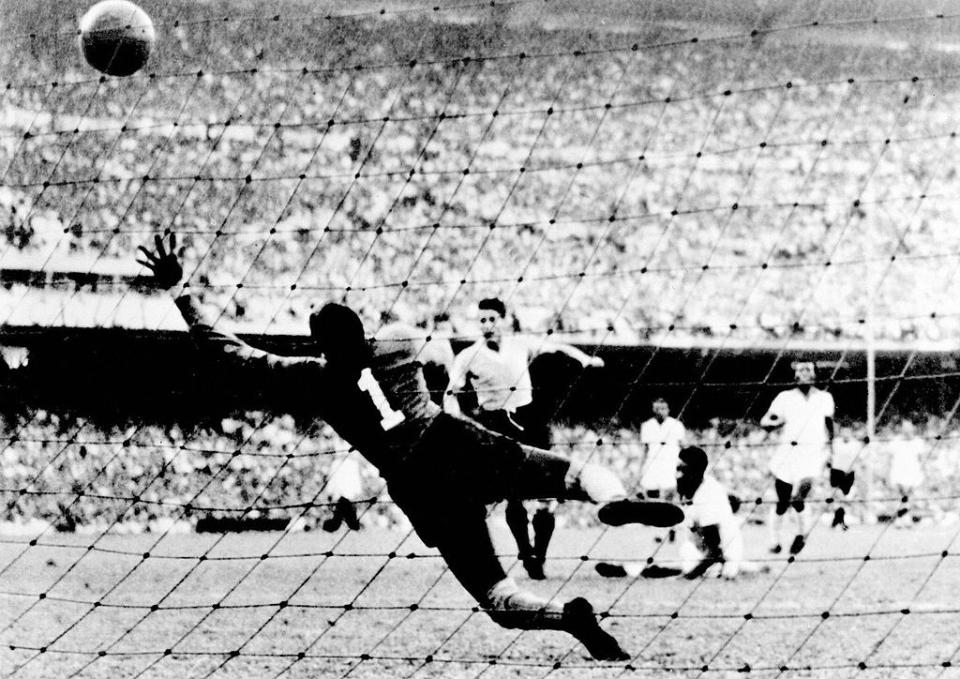
Tall and slender, Schiaffino possessed a deft touch and sublime technical skills which made him frustratingly unpredictable for opponents. He was one of the most dominant attacking players of his era, winning four championship titles in Uruguay with Penarol, then moving to Italy and helping Milan to win three titles in five years.
His greatest achievement was undoubtedly at the 1950 World Cup – the tournament won by Uruguay against all odds, where he scored in the de-facto final.
15. Jairzinho
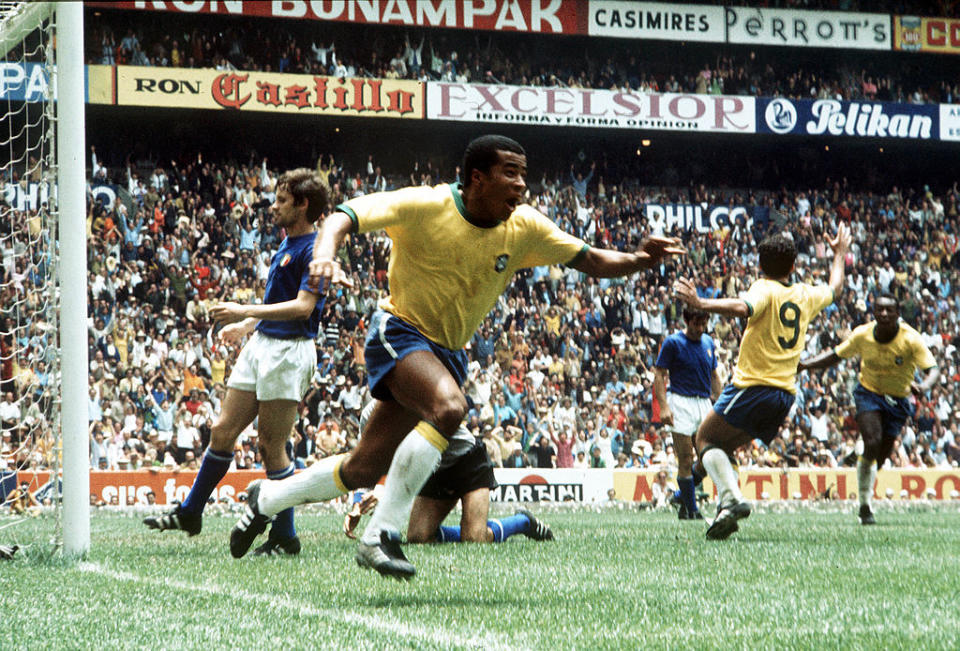
His devastating bursts of speed and lethal shooting secured him a place in history after the 1970 World Cup. That Brazil side inspired a generation of footballers and had in Jairzinho one of their biggest stars, despite him being relegated to the outside positions by Pele and Tostao.
He’s still the only player to have won the World Cup while scoring in every game in the tournament. If it wasn’t enough, the former winger would later show an eye for talentspotting, taking a then-skinny Ronaldo to Cruzeiro and recommending him to the Brazil youth team.
14. Jose Manuel Moreno
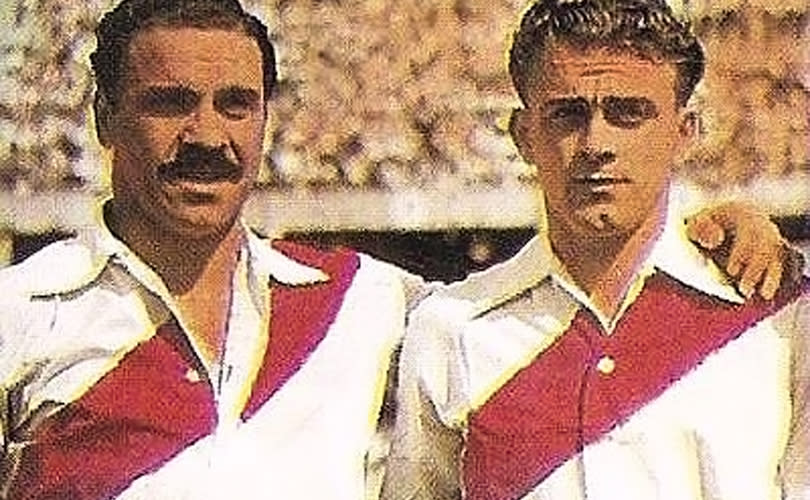
A striker of incredible talent, Moreno was the lynchpin of the so-called La Maquina (The Machine), the great River Plate team of the 1940s that was hugely important to the tactical development of South American and world football. The team were the first to frequently exchange positions in attack.
Moreno seemingly had no weaknesses as a player, showing sublime technical skills, physical strength and vision to lead his team to six championship titles. Later on, he won league titles in Mexico, Chile and Colombia as well – becoming the first ever footballer to do so in four countries.
13. Didi
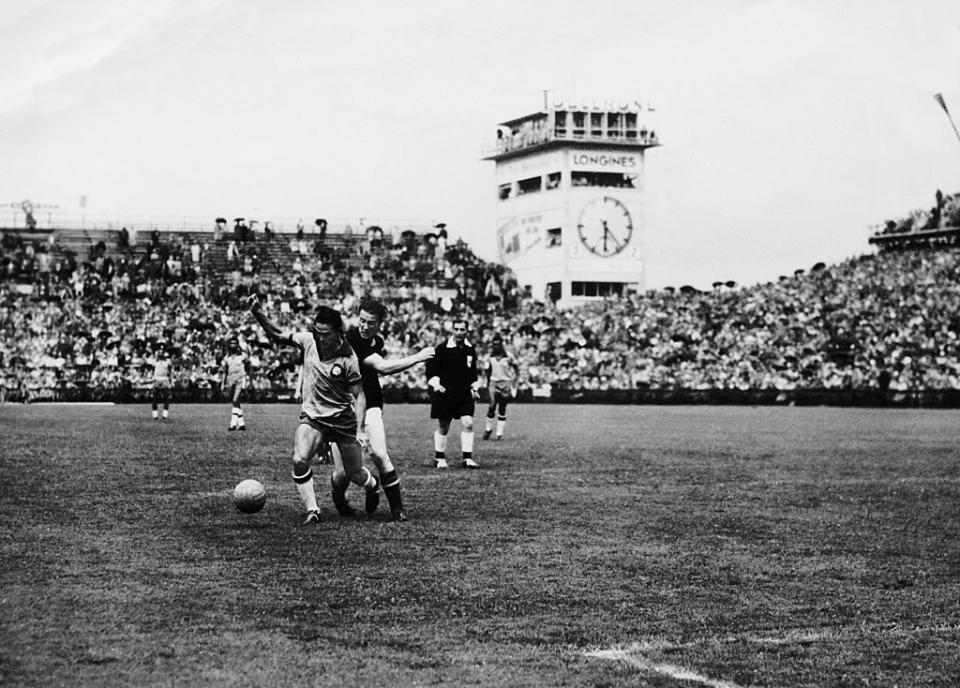
“I’m nothing compared to Didi. I’ll never be anywhere near as good as he is,” Pele once said.
Dubbed the Ethiopian Prince because of his elegant style, the midfielder won the World Cup with Brazil in 1958 and 1962, and even had a stint with Real Madrid. In 1958, he beat Pele and 13-goal Just Fontaine to player of the tournament
12. Romario
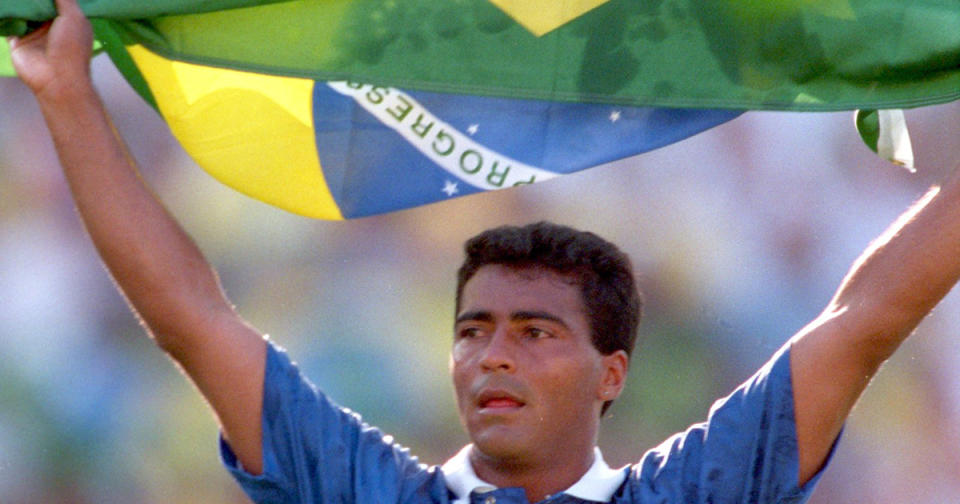
The king of the toe poke, the Brazilian had dazzling close control and nerveless finishing abilities - when he was through on goal, the keeper was basically doomed. Prolific for Vasco da Gama, PSV and Flamengo, he was the first player to net 100 goals for three different clubs.
He was the player of the tournament at the 1994 World Cup, as Romario led Brazil to glory.
11. Rivaldo
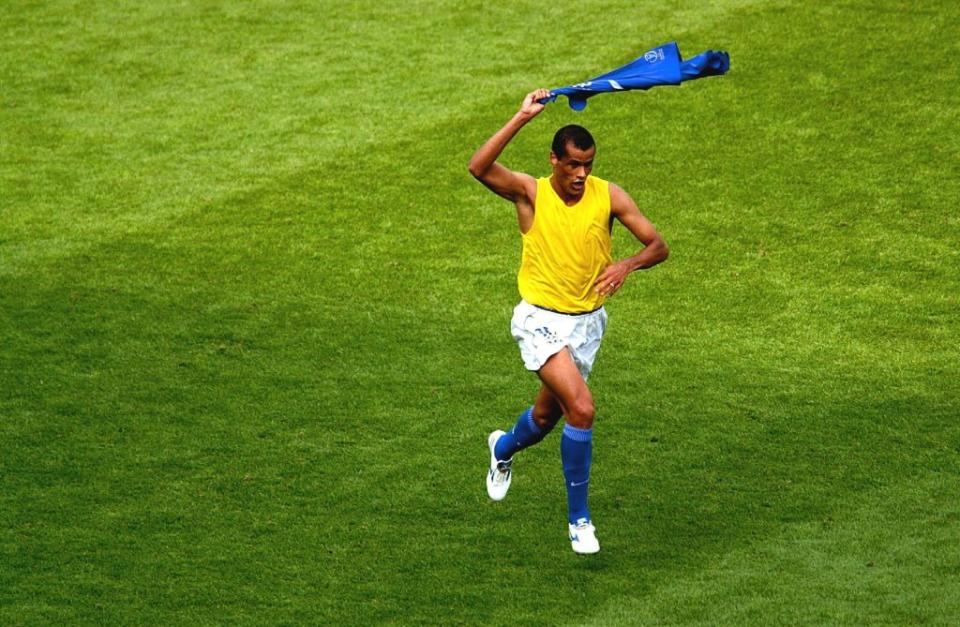
Possessing one of the deadliest left feet in football history, the Brazilian won the Ballon d’Or after guiding Barcelona to a second successive title, then helped his country to glory in 2002. “Ronaldo was our most talented player, but Rivaldo was even better at that World Cup,” Edmilson said.
The scorer of the greatest World Cup ever? Probably. A stunning overhead kick against Valencia completed his treble and rescued Barcelona’s Champions League qualification in 2001: it's still lauded over two decades later.
10. Socrates
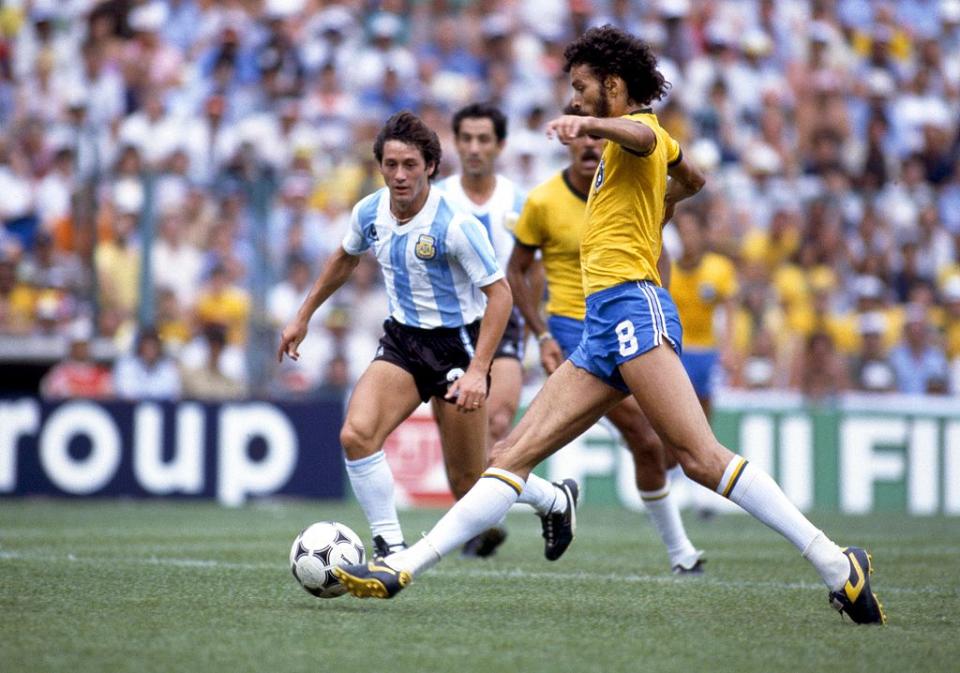
Perhaps the ultimate bohemian icon in football history, a deep thinker in all areas of life and a formidable midfielder of one of the greatest sides Brazil has ever produced. He made the no-look backheel pass his own signature - surely the finest footballer ever to play for Garforth Town.
9. Carlos Alberto
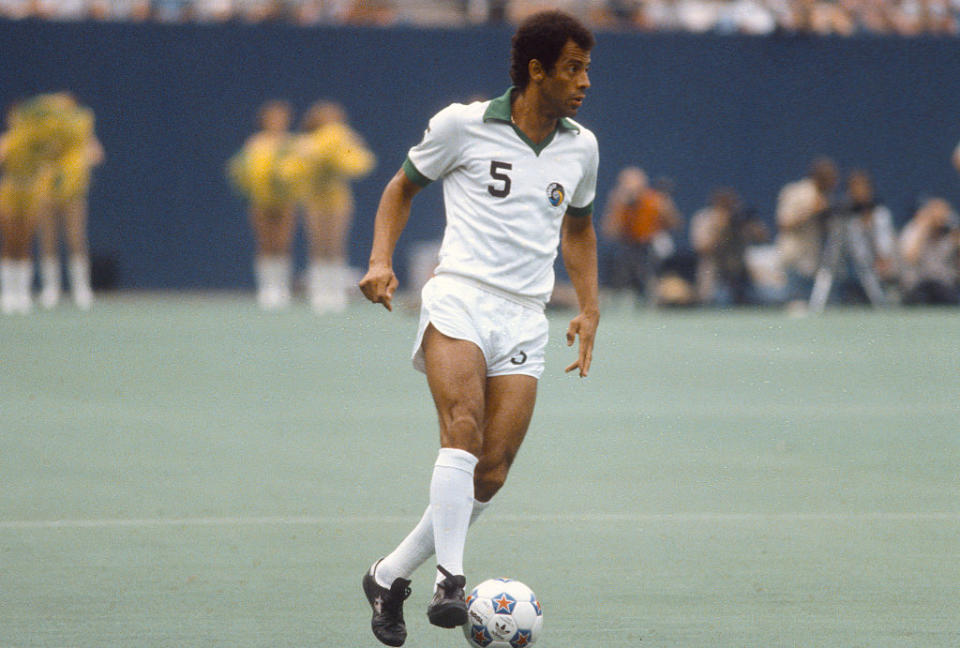
Brazil’s captain led the way for a new generation of more attacking full backs, paving the way for Cafu, Roberto Carlos and more. His leadership was pivotal at the World Cup in 1970, and he also enjoyed success alongside Pele at Santos.
His stunning finish in the World Cup final against Italy, rounding off a stellar team move, is rated by many as the greatest ever scored.
8. Ronaldinho
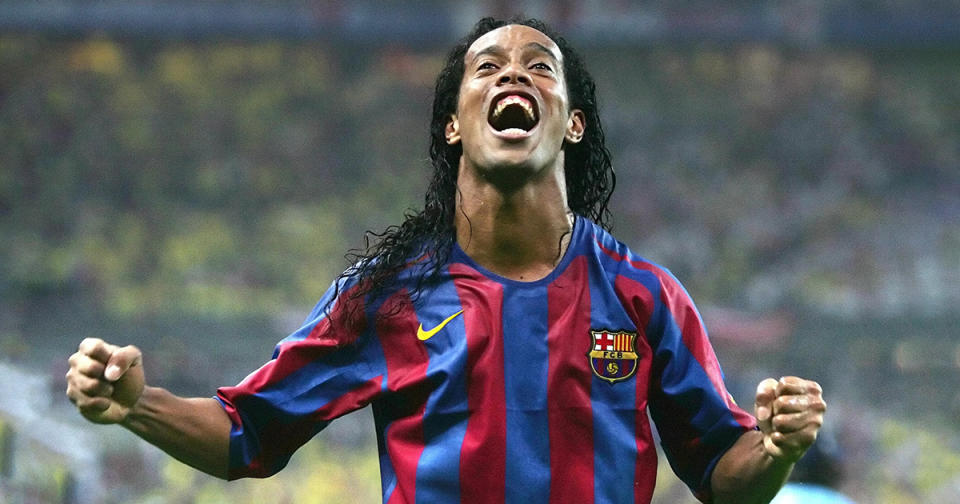
His buck-tooth smile made him one of the most recognisable faces in football. Ronaldinho was a rare case of a man who could make the unpredictable seem commonplace on the field. He was twice voted FIFA World Player of the Year, and was indeed the best player on the planet in the mid-2000s.
If greatness was measured in joy, Ronaldinho would leave the others by some distance during his five seasons at Barcelona, which delivered two league titles and a Champions League crown. He would later emulate his best days at Atletico Mineiro in their victorious Copa Libertadores campaign.
Winning the 2002 World Cup as part of a formidable trio with Ronaldo and Rivaldo dubbed by Brazilian commentator Galvao Bueno as ‘the three Rs’ cemented his place as a national hero forever.
7. Garrincha

After the Selecao lost Pele to injury early in the 1962 World Cup, Garrincha took hold of the team himself, ending as the tournament’s undoubted star man.
“In the entire history of football no one made more people happy,” said Uruguayan writer Eduardo Galeano. He was speaking about an angel. Not an ordinary one, but an angel with bent legs (in Portuguese, um anjo de pernas tortas).
Garrincha had several birth defects. His spine was crooked. His right leg bent inwards. His left leg was six centimeters (more than two inches) longer than the right, and curved outwards following childhood surgery.
Garrincha’s favorite trick was to run off, leaving the ball behind but taking his marker with him. He would return and do it again and again, before eventually going forward with the ball, leaving the duped defender stood still.
Struggling with his knees at the end of his career, his drinking caught up with him. He died at the age of just 49, leaving three ex-wives and 14 different children – one of them in Sweden – behind. Yet in Brazil, the angel is best remembered by his other nickname: Alegria do Povo. The Joy of the People.
6. Zico
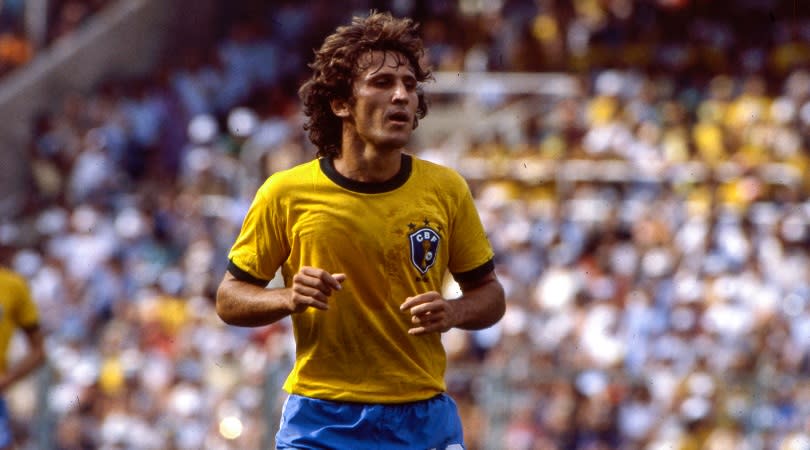
He’s the greatest Brazilian to never win a World Cup. Pele once said: “The one player that came closest to me in playing style was Zico.” He scored 333 goals at the famous Maracana stadium alone and guided Flamengo to four league titles, one Copa Libertadores and another Club World Cup in the '80s.
While Brazil's memorable World Cup campaign in 1982 ended in disappointment, Zico scored four times in his five appearances and was named in the team of the tournament. He also played in the 1986 World Cup, but was far from fully fit as Brazil lost to France in the quarter-finals.
Despite this, Brazilian fans would wish each other Happy Christmas to celebrate his birthday every March 3. You definitely don't get that for nothing, either.
5. Ronaldo
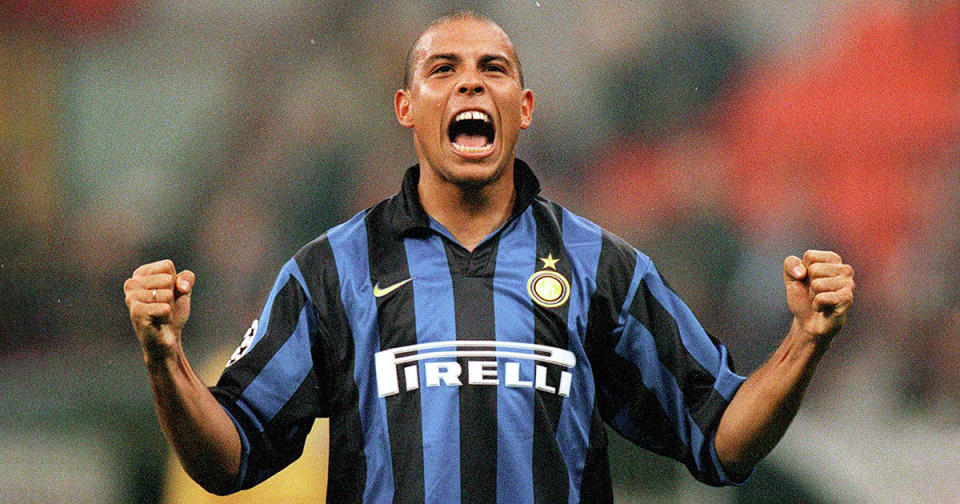
The bald-headed, gap-toothed kid’s place in the pantheon of modern greats is now secure. He won his first FIFA World Player of the Year award at the tender age of 20 in 1996, went on to become the second footballer to be honoured three times, claimed the Ballon d'Or twice and became the World Cup’s greatest scorer in 2006 with his 15th strike (since surpassed by Miroslav Klose in 2014).
Has there ever been a more impressive debut season for a club anywhere in the world than R9 managed in Barcelona? The Brazilian scored 47 goals in 51 matches as the Catalans won the Copa del Rey and UEFA Cup Winners’ Cup, and narrowly missed out on La Liga – but Barça couldn't hang on to him for long, as the forward signed for Inter in 1997 and was the star attraction at the 1998 World Cup, where he won the Golden Ball and finished with four goals.
Yet the last chapter infamously didn't go as planned: he suffered a fit before the final against France and failed to perform after he was eventually named in the starting line-up, as Brazil lost 3-0 to the hosts. He later signed for Real Madrid and showed tantalising glimpses of his best form as one of the galacticos. Yet Ronaldo was never quite the same again and retired in 2011 – still scoring goals, but with his game necessarily reinvented thanks to his loose lifestyle and dodgy knees.
4. Alfredo Di Stefano
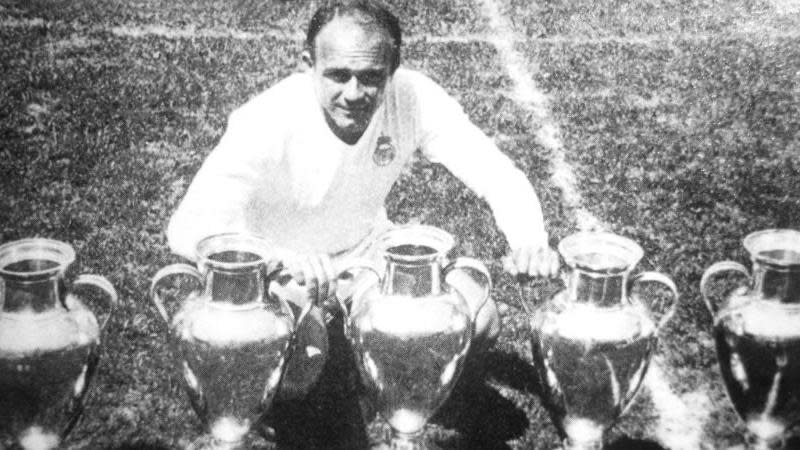
“Who is this man? Wherever he is on the field he is in a position to take the ball. You can see his influence on everything that’s happening,” wrote Bobby Charlton after seeing Di Stefano play for Real Madrid in 1957.
The Blond Arrow may not have boasted the natural gifts of players like George Best or Diego Maradona, but Charlton and Franz Beckenbauer, among others, have both stated that Di Stefano was probably the best all-round player to grace football.
Real Madrid fought tooth and nail with bitter rivals Barcelona for his signature. In the midst of an acrimonious battle between the giants, the Spanish Football Federation suggested both clubs share the player, but controversially awarded Madrid the first bite at him. Barcelona officials claimed that Francoist influence was the root cause of the federation’s decision, but were later persuaded to sell their rights to the player anyway.
Throughout the next 11 campaigns, Di Stefano won eight Spanish titles, plundered 218 goals in 282 matches and won five consecutive European Cups. Naturally, he scored in all five finals. On the final day of the league season in 1958/59, with both players level on goals scored, Ferenc Puskas passed to his team-mate rather than score himself. Nonetheless, the Hungarian said of him: “Di Stefano is the best there has been, or is ever likely to be.”
3. Diego Maradona
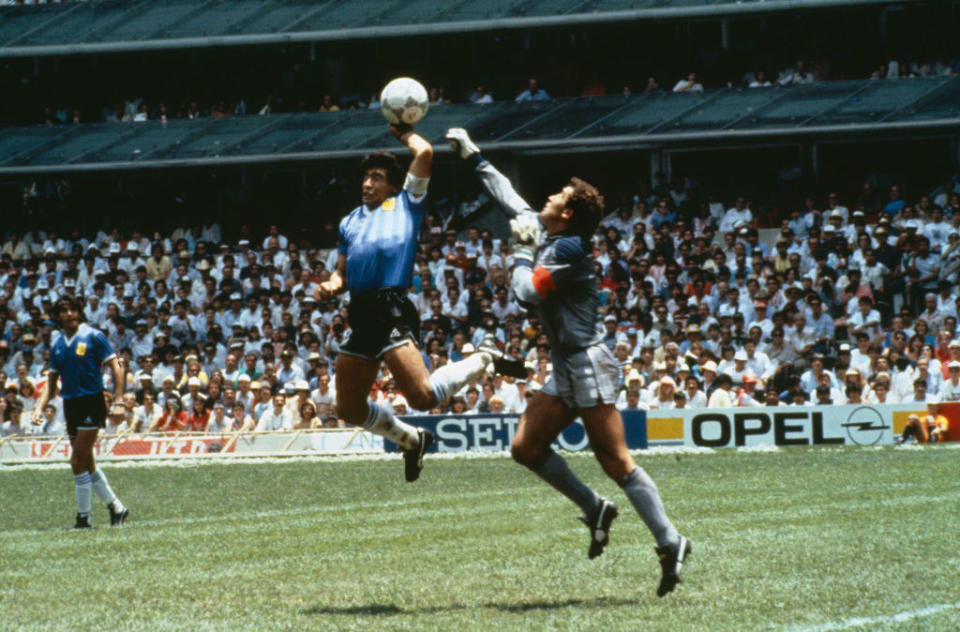
How do you separate the three greatest footballers of all time? Any of them would have been worthy winners, but we can only pick one.
Longevity, goals and trophies are where Lionel Messi and Pele arguably have the slight edge but, boy, Maradona was exciting. The Argentine was the rebel who produced possibly the most iconic individual goal ever scored, on the way to maybe the greatest World Cup triumph of all in 1986. A man who’s been deified in both his homeland and the Italian city of Naples.
Just 5ft 5in tall, El Pibe de Oro’s dribbling skills enthralled a generation, from the moment he made his Argentinos Juniors debut as a 15-year-old, and nutmegged an opponent with his first touch. He scored 116 goals in 166 games then joined Boca, winning the league title after a solo goal against rivals River Plate.
Barcelona paid £5m a year later - within months, he’d taken Real Madrid apart at the Bernabeu, before injury and illness struck him down. He moved to Napoli for £6.9m in 1984, the first player transferred for a world record fee on two separate occasions. There came his finest days - inspiring his new club to the only two league titles of their history, after World Cup glory in Mexico. He captained Argentina to another final in 1990.
Yes, he never won the European Cup, or progressed beyond even the last 16, but Maradona was about so much more than mere trophies.
2. Pele
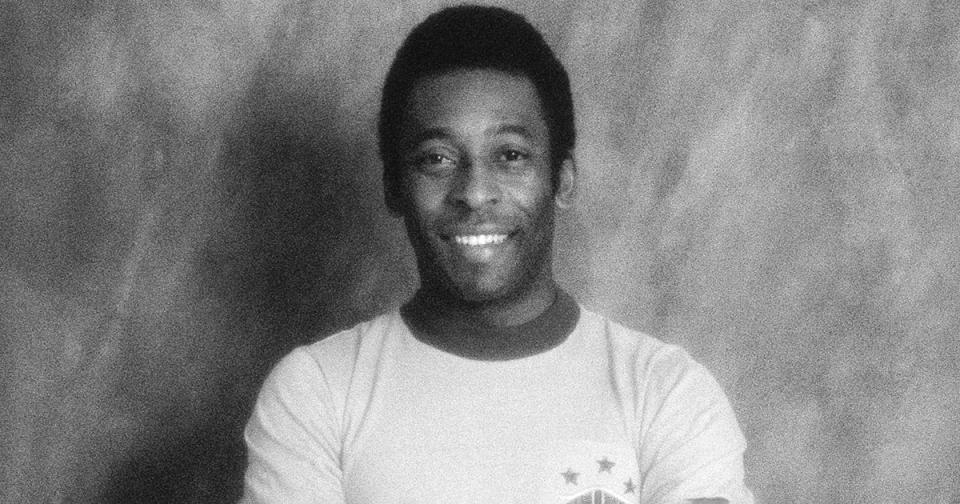
At the age of 17, in 1958, Pele became the youngest player to feature in a World Cup final. He scored six times in Sweden, including a semi-final hat-trick and two more in the final. It was to be the first of three World Cup trophies he brought back home as an answer to those tears he saw running down his dad’s face.
His contribution in 1962 was minimised by injury, while the persistent fouling of him in 1966 made him swear that it would be his last World Cup. He didn’t stick to it. He was convinced into returning for a fourth tournament in 1970 and became part of one of the best attacks ever compiled – alongside Tostao, Jairzinho, Rivellino, Clodoaldo and Gerson. While Jairzinho top-scored, Pele added four more to his World Cup tally.
In the 1960s and '70s, Pele travelled the world with his club team Santos. In Nigeria, a two-day truce was declared in the war with Biafra as a way for both sides to watch him play. His impact on the Nigerian football psyche is so huge that when he predicted an African nation would win the World Cup before the noughties, local fans already saw it coming.
“In some countries they wanted to touch him, in some they wanted to kiss him. In others they even kissed the ground he walked on,” said his former team-mate Clodoaldo.
The Brazilian played his last game for Santos in 1974 and postponed his retirement plans to sign for the New York Cosmos. He was in debt and desperate to recover his finances, so chose to move to the North American Soccer League. After leading the Cosmos to the NASL title in 1977, he played his farewell game on a rainy New York day. But how many days he'd brightened before that.
1. Lionel Messi
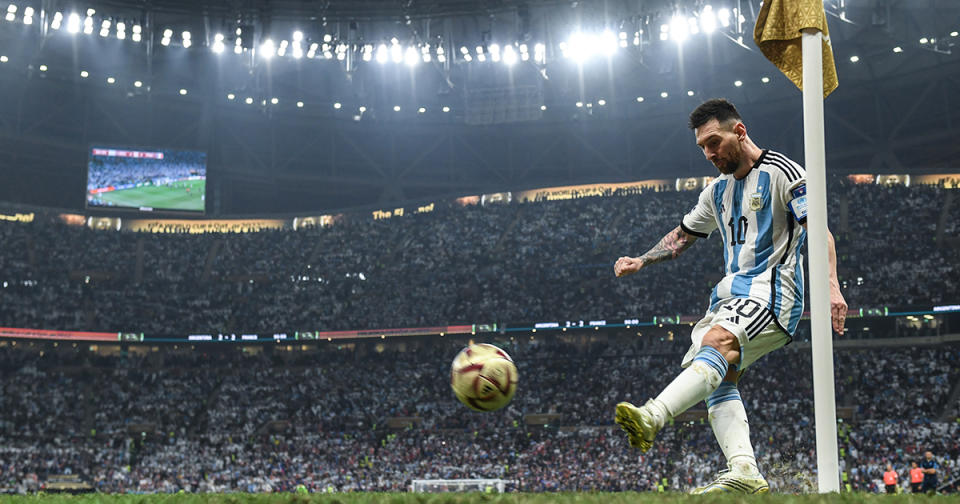
The history books will laud Messi, and yet their limitations will do him a disservice. In 20 years, young football fans will read about a messianic figure whose brilliance stunned the world, shattered a litany of records and started an era of dominance… but not until they watch the videos will they get an idea of what they have missed.
The quantity of his goals pale in comparison with their beauty. The goal of the month may not even make his top 20, be it a solo run, a bending free-kick, a cheeky lob, a golf putt finish or a thunderous missile.
By now most know his story: how expensive medicine for a growth hormone deficiency led him from his home town Rosario to Barcelona, where his 2004 debut started an era of brilliance. He has been voted into the world's top three players for 10 years, and in the top two for nine.
It’s one thing to reach the top, quite another to stay there. There are fans well into their 20s who have never known a world in which Messi is not spellbinding us on a weekly basis.
Only by evolution has Messi managed to maintain his level. The livewire dribbler has become a mature playmaker who now dictates play while still proving decisive in the final third. Never has Messi, now in his 30s, better balanced playmaking, dribbling and goalscoring.
As Javier Mascherano has said, he is three players in one. You could argue that one of the greatest goalscorers of all time is also the best passer, and you would not lack evidence to support your claim.
In the meantime, pundits, fans and writers will try to express his greatness with words and metaphors. They will all fail, as will the article you are reading now. The best we can do is listen to Pep Guardiola, who said: “Don’t write about him, don’t try to describe him. Just watch him.”

